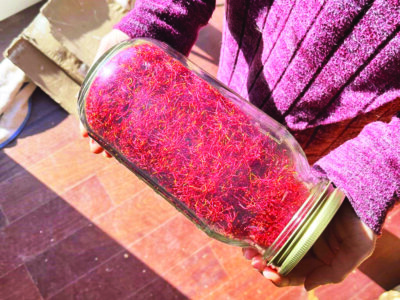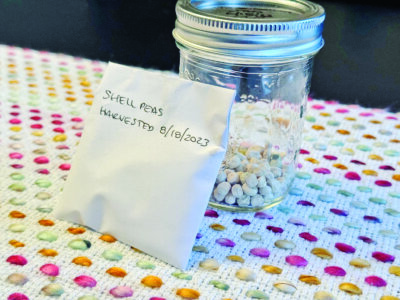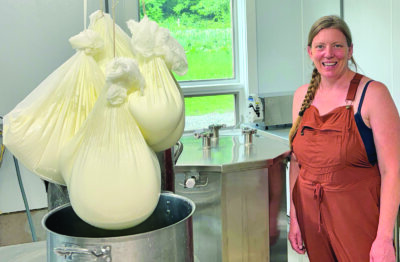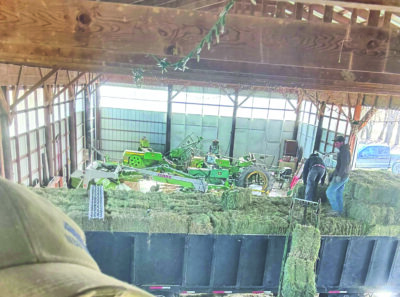Goat situation reveals cracks in animal welfare system
During the summer lots of goats died at a farm in Charlotte’s West Village. After residents intervened, the situation appeared to have been fixed about six months ago.
But those involved with helping to save the remaining goats are not satisfied.
They say their efforts to get someone from the town or the state to intervene resulted in a runaround, and it took too much time to stop the baby goat deaths at the farm on Ferry Road.
The terrible situation was reported in VTDigger earlier this month, and Lark Thompson, who was instrumental in turning the dire situation around, appeared before the selectboard on Feb. 13 to call for the town to do what it can to expedite the process for reporting neglected or mistreated animals.
She described all the phone calls and agencies she reached out to in the summer, and how after she found someone to investigate, it took over four days before they came.
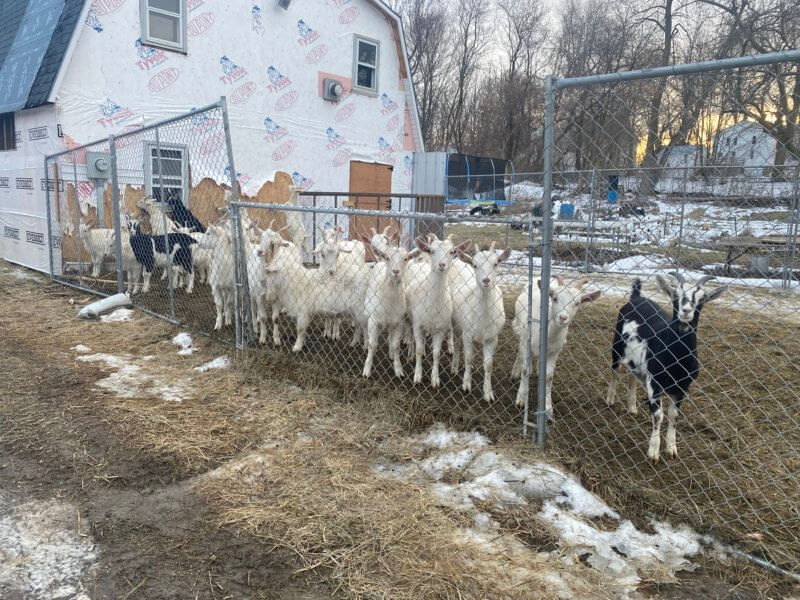
On Feb. 13, the goats at Village Farm in Charlotte looked healthy and playful.
“I sent videos. I sent pictures. And it was still four days later,” Thompson said. “I said, ‘How many animals are going to die in that process in those four days?’”
She asked the selectboard to help create something that has the authority to do this type of investigation and “not different agencies.”
Known as Village Farm, the property is at least 55 acres that Robert Mack and Ko Gyi leased from Mike Dunbar. Dunbar developed Charlotte Crossings north of town on Route 7.
The property he owns for the farm stretches from the west behind Charlotte Crossings north to Ferry Road. The entrance to the farm is from Ferry Road and includes the acre of land where the Charlotte Health Center proposed to build a new facility before abandoning that plan.
According to Mack and Ko Gyi, they leased the land for the farm from Dunbar. Mack said in a text that he hasn’t been involved with the farm since last June.
Ko Gyi said he has about 44 goats remaining and that he is now partners with Dunbar. He thinks they lost almost 65 goats. He estimates that about 15 were killed by predators. The rest starved or were killed by disease.
In June, The Charlotte News reported on the new farm. At that time, in addition to the goats, there were ducks, turkeys and sheep. All of those other animals have been removed.
One of the first people to realize something was wrong at the farm was Katherine Knox, Lark Thompson’s mother. Knox owns Hands and Heart Farm in east Charlotte where she raises sheep.
Knox called the town and a bunch of state agencies and never found a person to look into the situation. About a week later, Thompson went through the same process, but she continued to push and eventually got someone from the state Agency of Agriculture to visit the farm. When the state visited, Thompson met Dunbar for the first time.
“He took the state’s coming very seriously and hired Lark to help him figure out what the goats needed,” Knox said.
Dunbar did not respond to multiple attempts to contact him, but in a post on social media he said he was disappointed to see a story about the situation after so much time has passed.
However, he wrote, “I understand why people are upset. I was distraught, too.”
The system for feeding the goats had broken down. Thompson said there was confusion about who was going to feed when, and sometimes the goats went unfed.
Thompson set up a feeding schedule and recruited people to help in making sure the goats got fed and watered regularly.
Knox said the baby goats are fed milk replacer that is mixed with water, and before they got involved, the replacer was being mixed with an eighth of the recommended amount, so even if the goats had been fed consistently, they still would have starved.
Ko Gyi confirmed this, saying the baby goats were not getting enough protein to survive. Although he had tended goats in Myanmar before he immigrated to the United States, he said this is his first experience as a farmer.
According to VTDigger, although the Agency of Agriculture’s report found some of the goats may have had diarrhea and an intestinal tract infection, they found no dead goats, and concluded the farm’s “practices were acceptable.”
Thompson said the state didn’t find any dead goats because they notified the partners about their impending visit, so any dead goats were removed.
When town officials were contacted about the situation they referred them to the town’s animal control officer, but Charlotte does not have an animal control officer. It just has a canine control officer.
When people called Isaiah Moore, the current canine control officer, he referred them to the state. Moore said, when he took over the position in the fall of 2021, he was told that, just like the title of the position indicates, his authority only extends to dogs.
Town administrator Dean Bloch said, in 2017, at the request of the animal control officer then, the title was changed to canine control officer to reflect the reality of the town’s ordinance outlining the position. That ordinance only refers to dealing with nuisance dogs.
So, the state police are supposed to handle allegations about livestock in Charlotte.
People were also referred to the Humane Society of Chittenden County whose CEO Joyce Cameron said her organization does not have the authority to initiate investigations about livestock or pets being mistreated.
“It’s different in every municipality across the state. It’s kind of the Wild West. Some towns have really robust animal control officers, and their job encompasses a lot,” said Cameron, who has lived in Charlotte for 35 years.
During those years, although there have been little changes to how this town deals with animal neglect or mistreatment, it seems to her it’s always been primarily just about dogs.
Cameron said she has been working with a group that includes the heads of humane societies and animal welfare agencies in Vermont for a year and half on Act 147 that they hope will deal with the cracks in the system the problems at Village Farms expose.
The problems at the farm are a perfect example of the things the group wants legislation to be passed to solve: “Who is in charge? What is the oversight? Are there any regulations?” she said. The situation exposes “the absolute, abject failure of a system around animal welfare.”
Legislation is needed because animal welfare statutes are a “patchwork” in Vermont.
There are hundreds of statutes that deal with animal welfare laws, and they are all over the place, Cameron said. Most of those statutes are in the Agency of Agriculture, but some are in the Department of Public Safety, some are even in the Department for Children and Families.
“It only makes sense to unify those,” she said.
Even though it will cost Vermont some money, the group she’s working with hopes the state will create one agency, a new division of animal welfare.
Related Stories
Popular Stories
If you enjoy The Charlotte News, please consider making a donation. Your gift will help us produce more stories like this. The majority of our budget comes from charitable contributions. Your gift helps sustain The Charlotte News, keeping it a free service for everyone in town. Thank you.
Andrew Zehner, Board Chair




